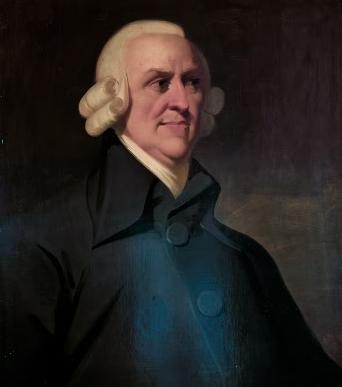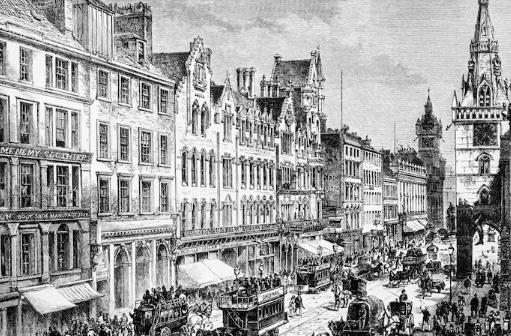In the year 2023, the world celebrates the 300th birth anniversary of Adam Smith, the renowned 18th-century British economist who continues to be recognized as the founding figure of modern economics.

Adam Smith was born in Kirkcaldy, a town on the east coast of Scotland. He pursued his education at the University of Glasgow and later at Balliol College, Oxford, although he held a low opinion of his experience there. Smith eventually became a professor of moral philosophy at the University of Glasgow. Despite his intellectual stature, Smith led a modest and unassuming life, rarely venturing far from home except for a European tour in the 1760s, which he undertook while accompanying one of his students. He passed away in Edinburgh in 1790.
While Smith’s personal life may have been uneventful, his intellectual contributions made him a prominent figure in the Scottish Enlightenment. His renowned book, “The Wealth of Nations,” published in 1776, holds a significant place in history. It stands as one of the most influential works ever written, surpassed only by Karl Marx’s “Das Kapital,” and continues to be widely cited as a cornerstone of classical economics.
Through my research, it becomes evident that Smith’s significance extends far beyond his title as the “father of economics.” He was a multifaceted thinker, encompassing roles as a philosopher, historian, and political theorist. His lifelong dedication was to unravel the moral, social, and political implications, both positive and negative, of the evolving capitalist and industrial economy in late 18th-century Britain. Here, I present five compelling reasons that solidify his position as Britain’s most influential economist.
He pioneered fundamental economic principles

Among the ideas that Smith originated or popularized are productivity, free markets, and the division of labor. His concept of the “invisible hand,” which refers to the unseen forces that govern the market economy, continues to be a key metaphor in modern economic discourse.
In the 19th century, economists influenced by Smith, such as David Ricardo, played a crucial role in establishing economics as a formal discipline by introducing mathematical language into economic reasoning. Smith’s groundbreaking exploration of the principles of supply and demand foreshadowed the development of the general equilibrium economic model. Furthermore, his theory of economic growth served as inspiration for subsequent economists, including John Maynard Keynes, in developing the concept of gross domestic product (GDP).
He commands a devoted following
Smith’s fame preceded the publication of Wealth of Nations during his lifetime. While serving as a professor of moral philosophy at the University of Glasgow from 1753 to 1763, his renowned reputation drew students from distant places.
Nevertheless, in the 20th century, Smith emerged as a revered figure among advocates of free markets. The establishment of the Adam Smith Institute, an influential think tank in the 1970s committed to economic liberalism, is a testament to his enduring influence. It is even said that former Prime Minister Margaret Thatcher carried a copy of Wealth of Nations in her handbag, further cementing Smith’s significance in shaping economic policies.
Smith’s legacy is often lauded, even by those who may not have delved into all of his writings. He is often hailed as a visionary of individualism and neoliberalism, credited with anticipating the advent of industrial capitalism and presenting compelling arguments against government intervention. However, such a portrayal oversimplifies his extensive body of work and overlooks the nuanced perspectives he offered.
Contrary to popular belief, “Wealth of Nations” did not promote a pure celebration of individualism. Adam Smith was acutely aware of the potential dangers and shortcomings of unchecked capitalism. He acknowledged the importance of government intervention in order to mitigate economic inequalities. Smith advocated for measures such as breaking up monopolies, investing in public infrastructure like roads and bridges, and promoting education among the middle classes. His perspective emphasized the need for a balanced approach to ensure the well-being of society as a whole.
He made history as the first Scottish figure to feature on an English banknote

From 2007 to 2020, the esteemed figure of Smith graced the face of English £20 banknotes. Hailing from Kirkcaldy in Scotland, he proudly represented his Scottish heritage while leaving a lasting impact on the world of economics.
After Scotland’s union with England in 1707, Glasgow emerged as a prosperous city, brimming with merchants. The city capitalized on its connection to Britain’s expanding trade empire, establishing itself as a hub of commerce. By the 1740s, Glasgow had flourished into a bustling center of trade, fostering a thriving network that extended to North America and the Caribbean.
During his tenure at the University of Glasgow, Smith instructed the sons of affluent merchants involved in the lucrative sugar, tobacco, and slave labor industries. These influential families wielded considerable power in local politics and actively invested their wealth in shipping ventures and the emerging industrial sector. Their financial contributions played a pivotal role in the transformation of Glasgow, as the city underwent a remarkable architectural renaissance, characterized by the construction of impressive stone structures.
His wide-ranging expertise spanned multiple disciplines
During his time in Glasgow, Smith delivered lectures encompassing a wide range of subjects within the realm of moral philosophy. This multidisciplinary approach covered diverse topics including ethics, politics, religion, economics, jurisprudence, and history, reflecting Smith’s status as a polymath.
Smith transformed several of his university lectures into a highly acclaimed book titled “The Theory of Moral Sentiments.” With its publication in 1759, the book propelled Smith to fame and garnered widespread recognition across Europe, solidifying his reputation as a renowned philosopher and thinker.
While historians often focus on other aspects of his work, Smith considered his greatest accomplishment to be his role in educating young Scots on leading a virtuous and ethical life. In a letter to the principal of the University of Glasgow near the end of his life, he expressed that his 13-year tenure as a professor of moral philosophy had been the most fulfilling and esteemed period of his life.
His legacy is subject to controversy and differing interpretations

Smith’s economic theories have had a profound impact on both free-market economists and critics of capitalism, including Marx. While free-market economists draw inspiration from Smith’s ideas on market mechanisms and the relationship between wealth and labor, Marx found value in Smith’s analysis of emerging modes of production during the early stages of industrialization. This controversial legacy has led to diverse interpretations and ongoing debates about the implications of Smith’s theories.
Smith’s legacy continues to be a subject of contention, with both neoliberals and left-wing thinkers laying claim to his ideas. Neoliberals highlight his defense of free trade, while left-wingers emphasize his critique of the inherent flaws in capitalist economies. However, Smith himself would likely find the attempts to categorize him as either right or left perplexing. He was primarily an observer of the changing world around him, studying the early stages of industrialization, colonialism, and global trade. It is essential to reclaim Smith’s legacy from economists and recognize him as a perceptive commentator on the emerging modernity of Europe.
